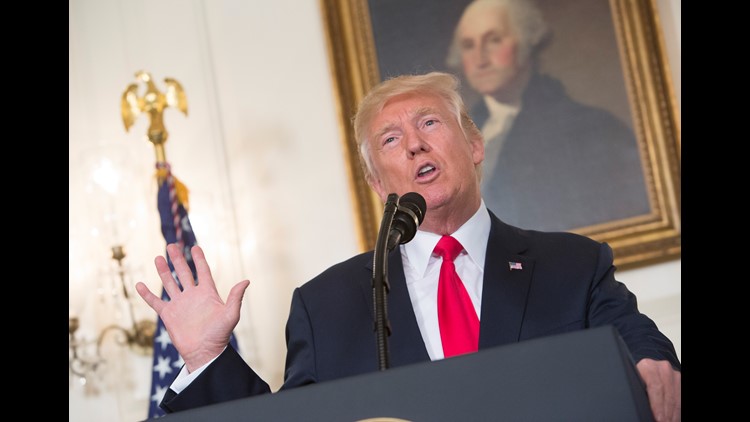By calling the lone suspect of the deadly car crash in Charlottesville "a murderer," President Trump may have unwittingly prejudiced the legal case against him – which legal analysts said could throw up roadblocks for bringing the alleged white nationalist to justice.
At the center of a new political firestorm for blaming both counter-protesters and white supremacists in a deadly clash this weekend in Virginia, Trump on Tuesday encouraged the judicial system to find the "fastest" path to a guilty verdict for 20-year-old Alex James Fields.
Yet Trump's off-the-cuff comments in a rollicking press conference in Trump Tower likely made it harder to seat an impartial jury, legal analysts said, and offered his defense lawyers an opportunity to argue the case should be moved out of Charlottesville.
“I think it is relevant to ask whether the president has infected the jury pool,'' said Vikram Kapil, president of the Virginia Association of Criminal Defense Lawyers. "I think it becomes very relevant for defense lawyers to ask potential jurors whether they agree with what President Trump said. You can't ignore it.''
Fields is charged with second degree murder, three counts of malicious wounding and failing to stop at the scene of an accident. The Ohio man was allegedly at the wheel of a car Saturday that slammed into a gathering of demonstrators who had assembled to counter a white nationalist protest in Charlottesville, killing 32-year-old Heather Heyer and wounding 19 others.
Two Virginia state troopers also were killed when their helicopter, involved in surveillance of the protests, crashed Saturday afternoon.
The suspect, who had joined the alt-right action to protest the removal of a statue of confederate Gen. Robert E. Lee from a local park, made his first state court appearance Tuesday.
Federal authorities also are investigating the death as a possible hate crime. On Wednesday, Attorney General Jeff Sessions said federal investigators were working closely with local authorities. Earlier this week, the attorney general said the alleged attack appeared to meet the definition of a domestic terrorism.
"I don't feel like we should feel like we have to do it in a matter of hours or even days," Sessions told NBC News.
In a rambling, impromptu news conference Tuesday, where Trump appeared to defend the alt-right protesters, the president also was unequivocal in his assessment of Fields.
"Well, I think the driver of the car is a disgrace to himself, his family and this country,'' Trump said, referring to Fields. "You can call it terrorism; you can call it murder. You can call it whatever you want. I would just call it as the fastest one to come up with a good verdict.''
Former Charlottesville-area prosecutor Denise Lunsford, who was appointed Wednesday to represent Fields, declined comment.
But Virginia criminal defense attorneys said they expected Trump's remarks to re-surface as Fields's attorneys weigh a possible effort to move the trial out of Charlottesville or seek to try the case before a judge, rather than risk the wrath of a potentially biased jury.
"It's probably inescapable that Trump's ill-advised comments will play some role here,'' said David Heilberg, a Charlottesville defense attorney. "It most likely comes into play in a change of venue.
"You're not going to find anybody here who doesn't know about what happened and may have formed an opinion about it. It only gets harder to sort through those possible biases when you have the president commenting on it,'' he said. "This practice of (Trump) shooting from the lip, well, it's kind of crazy.''
While potentially problematic, Trump's comments about a pending criminal case are not unprecedented for a sitting president.
In the immediate aftermath of the 1995 Oklahoma City bombing, President Clinton and Attorney General Janet Reno both announced their support for the death penalty in the case even before suspects were identified.
Later, attorneys for Timothy bomber McVeigh unsuccessfully sought to have Reno barred from participating in the Justice Department's decision to seek the death penalty. McVeigh was ultimately convicted and executed in 2001 for carrying out the attack.
While it is likely that Trump's remarks could be part of a defense argument for a change of venue, Kapil said prosecutors could just as easily seize on the president's words to keep the case in Charlottesville.
"There's not a person anywhere who probably didn't hear Trump,'' Kapil said. "So if even if are seeking a change of venue because of potential bias, I don't know where you would move it.''



